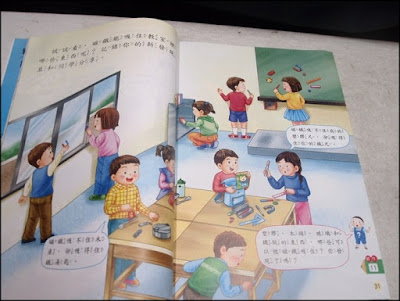第一單元: 春天 Unit 1: Spring
Squirrel: 春天快來了吧! Spring is almost here!
Squirrel: 春天到了嗎? Is spring here yet?
Bird: 是呀! Yes!
Squirrel: 真好! 我可以和大家見面了. Great! I can see everyone.
Bee: 我要多採一些花蜜. I want to collect more nectar.
Fairy: 我要努力練舞. I want to practice dancing more.
Squirrel: 我要... I want...
一 1北風 The North Wind
北風ㄏㄨㄏㄨㄏㄨ, The north wind [goes] "hoo hoo hoo"
一下子跑到東, 一下跑到西. One minute running to the east, one minute running to the west.
白天, 小松鼠在玩球, In the day, the little squirrel is playing ball,
北風大聲的說: "給我! 給我! 我們一起玩!" The north wind loudly says: "Give me! Give me! Let's play together!"
晚上, 北風輕輕的說故事給小松鼠聽. In the evening, the north wind softly tells the squirrel a story.
春天來了, 北風說: Spring is here, says the north wind:
"小松鼠再見, 在見了!" "Goodbye little squirrel, goodbye!"
語文焦點 Language Focus 一 1
我會寫字 (數字為扣除部首後筆畫數 / 總筆畫數) I can recognize words (number is the number of strokes minus the radical / total number of strokes)
[These are the characters/vocabulary that students would practice in their writing books at home. Radicals and the above-mentioned number of strokes are placed next to each character.]
1.北 north 2. 風 wind 3. 白 white 4. 松 pine 5. 玩 play 6. 給 give 7. 晚 late 8. 輕 light 9. 故 old/past* 10. 事 thing/event 11. 聽 hear/listen 12. 春 spring
*First graders wouldn't think of it this way though. 故 would go with 事, making 故事 (story). That would be all they needed to know!
我會認字 I Can Recognize Words
晚 / 星 late / star: 夜晚的星星最明亮. The stars are brightest at night.
故 / 放 past / put: 他把故事書放在桌子上. He put the story book back on the table.
聽 / 聲 hear / sound: 我聽到北風ㄏㄨㄏㄨ的聲音. I hear the north wind go "hoo hoo."
我會念 I Can Read
愛玩的北風, 一下子跑到東, 一下子跑到西. The playful north wind, one minute running to the east, one minute running to the west.
可愛的松鼠, 一下子爬上來, 一下子爬下去. The cute squirrel, one minute climbing up, one minute climbing down.
小木偶的鼻子, 一下子變長, 一下子變短. The little puppet's nose, one minute growing long, one minute growing short.
今天的天氣, 一下子出太陽, 一下子下大雨, 好奇怪! Today's weather, one minute the sun comes out, one minute it's raining, [it's] so strange!
說一說 Say It
[The sentences/phrases in this section are not arranged from top to bottom. The first sentence is in the middle, with arrows pointing outward to the others.]
小小樹葉像條船, 隨波漂流到處玩. The little leaf is like a boat, floating and playing everywhere.
漂到東, 看到一朵紅睡蓮. It floats east, and sees a red sleeping lotus flower.
漂到北, 你猜它會遇到誰? It floats north, guess who it bumps into?
漂到西, 遇到一隻小蝌蚪. It floats west, and bumps into a tadpole.
漂到南, 看到一根長竹竿. It floats south, and sees a long bamboo pole.
二 Two 春天來了 Spring Arrives
花園裡, In the garden,
花開了, The flowers open,
草綠了, The plants are green,
媽媽說: "春天來了." Mother says: "Spring is here."
弟弟問媽媽: Little brother asks mother:
"春天是誰? "Who is Spring?
他是坐車來的, Is she coming in a car,
還是走路來的?" Or walking over?
媽媽笑著說: Mother laughs and says:
"花開了, "The flowers open,
草綠了, The plants are green,
天氣暖和了, The weather is warm,
就是春天來了." This is what spring means."
語文焦點 Language Focus 一 2
我會寫字 (數字為扣除部首後筆畫數 / 總筆畫數) I can recognize words (number is the number of strokes minus the radical / total number of strokes)
[These are the characters/vocabulary that students would practice in their writing books at home. Radicals and the above-mentioned number of strokes are placed next to each character.]
1.園 yard 2.草 plant 3.綠 green 4.弟 brother 5.問 ask 6.誰 who 7.他 he 8.車 car 9.還 still 10.走 walk/move 11.著 to continue to do (used with verbs) 12.氣 spirit/breath/air
我會認字 I Can Recognize Words
門 door + 口 opening/intersection = 問 ask 問題 question 請問 request/excuse me
艹 plant + 早 early = 草 plant 草地 grassland 花草 flowering plants
亻person/people + 也 also = 他 he/him 他們 them 其他 other
汽 gas/steam + 米 rice = 氣 air/breath/spirit 天氣 weather 空氣 air
我會念 I Can Read
[introduces two ways of pronouncing the character 和, namely "han" with the descending tone (i.e. "and"), and "hwo" with the sharp tone (as in "nuan hwo" or "warm")]
花開了. The flower opens.
草綠了. The plant sprouts/becomes green.
太陽出來了. The sun has come out.
春天來了. Spring is here.
北風走了. The north wind goes/leaves.
讀一讀, 想一想 Read and Think About
弟弟問: "外婆是坐車來的, 還是走路來的?" Little brother asks: "Is grandma coming by car or walking?"
小白兔問: "今天是星期六, 還是星期日?" The little white bunny asks: "Is today Saturday or Sunday?"













